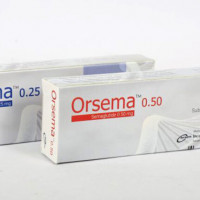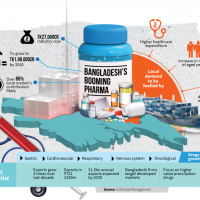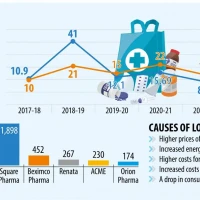FDA Approves Trelegy Ellipta for COPD
21 Sep, 2017

The US Food and Drug Administration (FDA) has approved once-daily, single inhaler triple therapy fluticasone furoate/umeclidinium/vilanterol (Trelegy Ellipta, GlaxoSmithKline) for patients with chronic obstructive pulmonary disease (COPD).
The approved indication includes "chronic bronchitis and/or emphysema [in patients] who are on a fixed-dose combination of fluticasone furoate and vilanterol for airflow obstruction and reducing exacerbations in whom additional treatment of airflow obstruction is desired or for patients who are already receiving umeclidinium and a fixed-dose combination of fluticasone furoate and vilanterol," according to a company news release. It is not indicated for acute bronchospasm or asthma.
The combination inhaler contains 10 µg fluticasone, an inhaled corticosteroid; 62.5 µg umeclidinium, a long-acting muscarinic antagonist; and 25 µg vilanterol, a long-acting β2-adrenergic agonist.
"This approval represents a significant therapeutic convenience for those appropriate patients already on Breo Ellipta that require additional bronchodilation or for those patients already on a combination of Breo Ellipta and Incruse Ellipta," Mike Aguiar, CEO of Innoviva Inc, explained in the news release.
The European Medicines Agency's Committee for Medicinal Products for Human Use recommended the combination inhaler on September 15. It is not currently licensed anywhere outside the United States.
The most frequent adverse events reported by patients using the inhaler (incidence ≥ 1%) are headache, back pain, dysgeusia, diarrhea, cough, oropharyngeal pain, and gastroenteritis.
The inhaler is not intended for use in patients with asthma because its safety and efficacy have not been established in this population. It should not be initiated in patients with acutely deteriorating COPD or acute symptoms.
The combination inhaler carries the same risks as those of its individual components. It should not be used in combination with other medications containing long-acting β2-adrenergic agonists because there is a risk for overdose. Patients taking systemic corticosteroids have an increased risk for potentially worsening infections, and susceptible patients may develop serious or fatal chickenpox or measles.
The inhaler should be used cautiously in patients with cardiovascular disorders, convulsive disorders, thyrotoxicosis, diabetes mellitus, and ketoacidosis.
GlaxoSmithKline expects to make the inhaler available in the United States soon.
The approved indication includes "chronic bronchitis and/or emphysema [in patients] who are on a fixed-dose combination of fluticasone furoate and vilanterol for airflow obstruction and reducing exacerbations in whom additional treatment of airflow obstruction is desired or for patients who are already receiving umeclidinium and a fixed-dose combination of fluticasone furoate and vilanterol," according to a company news release. It is not indicated for acute bronchospasm or asthma.
The combination inhaler contains 10 µg fluticasone, an inhaled corticosteroid; 62.5 µg umeclidinium, a long-acting muscarinic antagonist; and 25 µg vilanterol, a long-acting β2-adrenergic agonist.
"This approval represents a significant therapeutic convenience for those appropriate patients already on Breo Ellipta that require additional bronchodilation or for those patients already on a combination of Breo Ellipta and Incruse Ellipta," Mike Aguiar, CEO of Innoviva Inc, explained in the news release.
The European Medicines Agency's Committee for Medicinal Products for Human Use recommended the combination inhaler on September 15. It is not currently licensed anywhere outside the United States.
The most frequent adverse events reported by patients using the inhaler (incidence ≥ 1%) are headache, back pain, dysgeusia, diarrhea, cough, oropharyngeal pain, and gastroenteritis.
The inhaler is not intended for use in patients with asthma because its safety and efficacy have not been established in this population. It should not be initiated in patients with acutely deteriorating COPD or acute symptoms.
The combination inhaler carries the same risks as those of its individual components. It should not be used in combination with other medications containing long-acting β2-adrenergic agonists because there is a risk for overdose. Patients taking systemic corticosteroids have an increased risk for potentially worsening infections, and susceptible patients may develop serious or fatal chickenpox or measles.
The inhaler should be used cautiously in patients with cardiovascular disorders, convulsive disorders, thyrotoxicosis, diabetes mellitus, and ketoacidosis.
GlaxoSmithKline expects to make the inhaler available in the United States soon.






